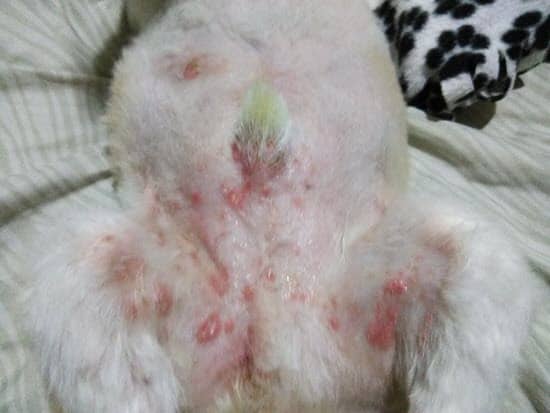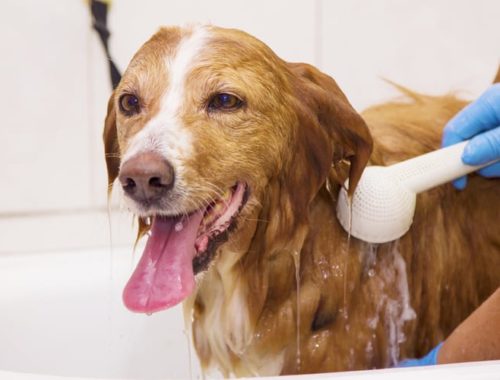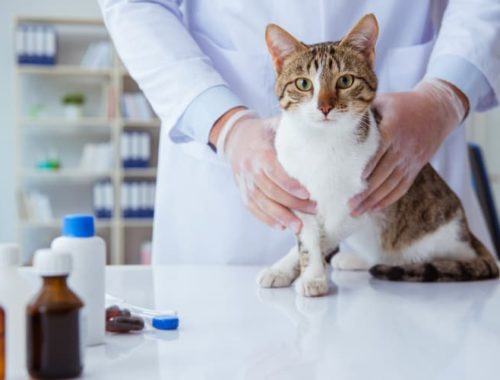Question: How Can I Help My Dog Recover from Chronic Staph Infections?
My dog, Riley(Long coat Chihuahua) started having these breakouts on him in either 2014 or 2015… My vet said that he had staph. She gave him an antibiotic shot & it cleared, however it ended up returning… I have noticed that it isn’t going away & coming back a little more… and more… I am very worried because I know staph is very serious & is just hard to beat period but you worsen it as your body gets immune to the antibiotics… So, he is having an outbreak now. He is taking an antibiotic & then we keep Microcyn on him…. Still to no avail, here we are. (I attached pics)
I spoke to a lady who actually had a dog die w/staph… She told me to do these 3 things & see if I see a difference… What do you think?
- Start him on a supplement: NuVet – She said it is amazing and will boost his immune.
- Switch food – He is currently on Nutro LID
I picked (3) from the list on this site to research further, can you provide your feedback on them?
- AvoDerm
- Dogswell
- Wellness simple LID
(All are the Lamb protein)
Thank you in advance!!
Morgan Gail Machnik

Answer:
Dear Morgan,
I’m impressed with the amount of thought you’re putting into caring for Riley! First, let’s clarify what bacterial dermatitis is and the possible consequences for most dogs.
The most common cause of bacterial dermatitis in dogs is Staphylococcus pseudointermedius. This bacteria is a normal inhabitant of dog skin. When your vet says it’s a Staph infection, she’s playing the odds. Another bacteria could be the culprit, but without a culture, it’s impossible to say for sure.
S. pseudointermedius usually causes no problems at all. Trouble starts when an underlying disease process causes changes in a dog’s skin. When this happens, the bacteria reproduce faster and cause inflammation.
Atopy, also known as allergies, is the most common underlying disease in canine bacterial dermatitis. The most common cause of allergies in dogs is inhaled pollen and contact allergies from things like dust mites and grass.
Another disease that causes changes in the skin is flea allergy. Hypersensitive dogs can have a lot of inflammation from even a single flea bite. Finally, skin changes can be caused by food hypersensitivity, but it’s less common than inhalant and flea allergies.
It’s unlikely the dog who died from staph had a routine case of bacterial dermatitis. Even when S. pseudointermedius becomes resistant to antibiotics, it rarely causes life-threatening disease when limited to a skin infection.
If a resistant bacteria infects a wound or a body cavity, the consequences can be serious. This sort of infection is relatively rare in veterinary patients.
The possibility of creating drug-resistant bacteria is an important reason to avoid overuse of antibiotics. It’s better to identify and treat the underlying disease. Ask your vet about diagnosing and treating allergies. There are allergy medications, topical products, and lifestyle choices that will allow you to minimize the use of antibiotics. Successful treatment requires a multi-pronged approach in most cases.
To answer your specific questions, some supplements can improve overall health. If NuVet does that with nutritional ingredients, it may be helpful. This can be part of your plan, but don’t depend on one product to solve the entire problem!
Food choices are very individual. All the brands you mentioned should be suitable to try. The best way to know if a new food will help Riley’s condition is to feed it for a minimum of three months. During that time, watch to see if you notice improvements in Riley’s skin and digestion. Don’t forget to change to any new food gradually over a period of 7-10 days to avoid digestive upset.
You might consider trying a fish and potato limited-ingredient diet. I’ve seen some dogs with skin problems improve with this simple change.
If you haven’t noticed any improvement after three months, seek your vet’s help. She can show you how to do a strict food allergy trial with a specialized food. Done correctly, these trials can determine whether a food allergy is an issue for your dog. If it’s not, then that frees up some of your resources to pursue finding the real cause of Riley’s skin problems.
Regards,
TB Thompson, DVM
































